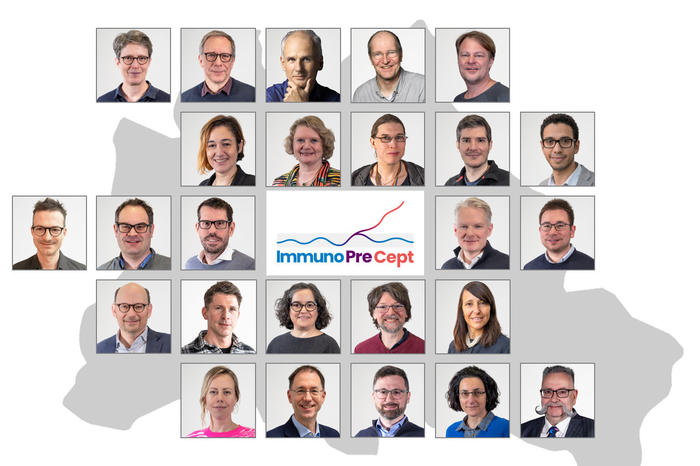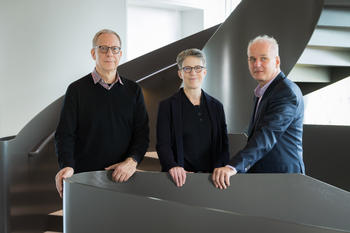ImmunoPreCept
Exploring the interface between health and disease for cell-based molecular prevention and interceptive medicine
ImmunoPreCept
Image Credit: Jacqueline Hirscher, DRFZ (Porträts), Marko Bulgakov (Berlin-Umrisskarte)
The growing prevalence of chronic diseases – including immune-mediated inflammatory conditions and cancer – reflects a failure to stably maintain immune-regulated tissue homeostasis. Current therapies often intervene too late and primarily address symptoms, while the early breakdown of regulatory homeostatic processes remains poorly understood.
ImmunoPreCept proposes a paradigm shift: health is seen as an active, dynamic process sustained by the continuous interaction between the immune and tissue systems to adapt organisms to changes in their environment. The aim is to identify preclinical stages where these mechanisms begin to fail, enabling early diagnostics and effective prevention.
By targeting the causes of disease and strengthening the foundations of lasting health, the scientists from the ImmunoPreCept Cluster of Excellence are making an important contribution to reducing the long-term burden on healthcare systems, improving people's quality of life and promoting health and resilience in the population. With its innovative research program, the Cluster of Excellence ImmunoPreCept thus makes a central contribution to realizing the promise of modern medicine: the extension of a healthy, disease-free life.
"With the funding of ImmunoPreCept, we have the opportunity to fundamentally change the medical perspective: Away from the reactive treatment of symptomatic diseases, towards a deep understanding of health as an active, immune-mediated process. By investigating how the immune system maintains a state of 'health' and how and when this process goes out of sync, we are creating the scientific basis for molecular prevention and early intervention.”
Prof. Dr. Britta Siegmund, Prof. Dr. Andreas Diefenbach (both Charité - Universitätsmedizin Berlin), Prof. Dr. Nikolaus Rajewsky (Max Delbrück Center for Molecular Medicine)
Based in Berlin, ImmunoPreCept brings together expertise from immunology, systems biology, medicine, and the social sciences. The initiative investigates how the immune system preserves tissue integrity, how dysfunction of homeostatic networks leads to disease onset, and how remission is linked to the restoration of such processes.
The program combines cutting-edge research with public engagement, policy dialogue, and education – with the goal of fundamentally transforming medicine, improving care, and sustainably reducing healthcare costs.
Prof. Dr. Britta Siegmund, Prof. Dr. Andreas Diefenbach (beide Charité - Universitäsmedizin Berlin), Prof. Dr. Nikolaus Rajewsky (Max Delbrück Centrum für Molekular Medizin)
Image Credit: Felix Petermann, Max Delbrück Center
Spokespersons: Prof. Dr. Britta Siegmund, Prof. Dr. Andreas Diefenbach (both Charité - Universitätsmedizin Berlin), Prof. Dr. Nikolaus Rajewsky (Max Delbrück Center for Molecular Medicine)
Applicant universities: Freie Universität Berlin and Humboldt-Universität zu Berlin for Charité - Universitätsmedizin Berlin
Partner institutions: Max Delbrück Center for Molecular Medicine in the Helmholtz Association, Berlin Institute of Health at Charité (BIH), German Rheumatism Research Center (DRFZ), Max Planck Institute for Molecular Genetics (MPI-MG), Museum of Natural History (MfN)
Cooperation Partners National: German Institute of Human Nutrition Potsdam Rehbrücke (DIfE), Potsdam-Rehbrücke, Max Planck Institute for Infection Biology (MPI-IB), Berlin
Cooperation Partners International: NOVA Institute of Medical Systems Biology (NIMSB), Lisbon, Portugal; Kennedy Institute of Rheumatology, Oxford, United Kingdom


